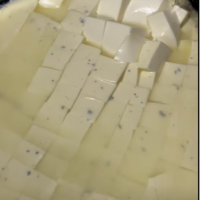Yes, rennet does expire, but when stored in the refrigerator, it will not go bad. Even past the ‘best by date,’ it will simply lose potency over time.
Rennet, a key ingredient in cheese making, has a shelf life and storage guidelines that ensure its effectiveness. Whether you have liquid or tablet rennet, understanding its expiration and storage is crucial for successful cheese making. We will explore the shelf life of rennet, how to store it properly, and how to determine if it has gone bad.
Understanding these aspects will help ensure that your rennet remains effective and that your cheese making endeavors are successful. So, let’s delve into the details of rennet expiration and storage to ensure your cheese making process is smooth and successful.

Credit: www.reddit.com
The Essence Of Rennet In Cheesemaking
Rennet does not expire but may lose potency over time when stored properly in the refrigerator. If past the ‘best by date,’ add slightly more rennet for cheesemaking. Different types of rennet have varying shelf lives, with liquid vegetable rennet lasting about a year.
What Rennet Is
Rennet is a complex enzyme mixture used in the production of cheese. It is obtained from the stomachs of young ruminants, such as cows, goats, and sheep. Rennet is a crucial ingredient in cheesemaking because it helps to coagulate milk, separating it into curds and whey.Rennet’s Role In Cheese Production
The primary function of rennet in cheesemaking is to coagulate milk. This process is essential because it helps to separate the curd from the whey. The curd is then cut, heated, and pressed to form the cheese. Without rennet, it would be impossible to produce most types of cheese, including cheddar, mozzarella, and Parmesan.Does Rennet Expire?
When it comes to the shelf life of rennet, it is essential to note that it will not go bad if stored correctly. Even past the ‘best by date,’ it will simply lose potency over time. However, it is crucial to test the rennet’s viability before use. It is recommended to store liquid rennet, both animal and vegetable types, in the refrigerator but should never be frozen. Liquid vegetable rennet has a recommended shelf life of about one year. In conclusion, the essence of rennet in cheesemaking cannot be overemphasized. Rennet plays a vital role in the coagulation of milk, separating it into curds and whey. Although rennet has a shelf life, it will not go bad if stored correctly. As a cheesemaker, it is crucial to test the rennet’s viability before use to ensure the production of high-quality cheese.Rennet Varieties And Their Lifespans
Rennet varieties have different lifespans, but generally do not expire when stored properly. Instead, rennet may lose potency over time, especially past the ‘best by date. ‘ It is recommended to adjust quantities accordingly if using rennet past its expiration for cheese making.
Animal Vs. Vegetable Rennet
When it comes to rennet, there are two main varieties: animal rennet and vegetable rennet. Animal rennet is derived from the stomach lining of young animals, usually calves, and contains enzymes that help coagulate milk to form curds. Vegetable rennet, on the other hand, is derived from plants such as thistles or mold, and it also contains enzymes that aid in the coagulation process.Shelf Life Of Different Rennet Types
The shelf life of rennet can vary depending on the type and storage method. Liquid rennet, whether animal or vegetable-based, should always be stored in the refrigerator to maintain its potency. It is important to note that liquid rennet should never be frozen, as it can affect its effectiveness. Liquid vegetable rennet typically has a recommended shelf life of about one year when stored properly in the refrigerator. After this time, the rennet may start to lose its potency, but it can still be used with slightly increased amounts to achieve the desired coagulation. When it comes to rennet tablets or kits, their shelf life can also vary. Cheese-making kits that include rennet tablets are usually good for at least one year at room temperature. If the rennet tablets are stored in the freezer, they can last for an additional two years or more. However, it is important to check the specific instructions or expiration date provided by the manufacturer to ensure the rennet’s effectiveness. In conclusion, the shelf life of rennet can vary depending on the type and storage method. Whether it is liquid rennet or rennet tablets, it is essential to follow proper storage guidelines to maintain the rennet’s potency for optimal cheese-making results.Storing Rennet Properly
Properly storing rennet is crucial to maintain its effectiveness. While rennet does not technically expire, it can lose potency over time. To ensure optimal results, store liquid rennet in the refrigerator and avoid freezing it, with a shelf life of about one year.
Proper storage of rennet is crucial to ensure its effectiveness and potency. Whether you have liquid rennet or rennet tablets, following the ideal storage conditions is essential to maintain its quality.
Ideal Storage Conditions
When it comes to storing rennet, it is recommended to keep it in a cool and dark place, away from direct sunlight and heat sources. The ideal temperature for storing rennet is between 35°F (2°C) and 45°F (7°C). This ensures that the rennet maintains its potency and does not degrade quickly.
The Impact Of Temperature On Potency
The temperature at which rennet is stored plays a significant role in its potency. If rennet is exposed to high temperatures, it can lose its effectiveness and may not work as expected. Therefore, it is crucial to store rennet in a cool environment to preserve its potency for a longer period.
Liquid rennet, both animal and vegetable types, should be stored in the refrigerator but should never be frozen. It is recommended to consume liquid vegetable rennet within one year for optimal results.
Rennet tablets, on the other hand, can be stored at room temperature if unopened. However, once opened, it is best to store them in an airtight container in the refrigerator to maintain their potency.
Remember, even if your rennet is past its “best by date,” it does not necessarily mean it has expired. Rennet will gradually lose potency over time, but it can still be used. If your rennet is a few weeks past the “best by date,” you may need to add slightly more rennet than usual to achieve the desired results.
By storing rennet properly according to the recommended conditions, you can ensure that it remains effective for your cheese-making endeavors.

Credit: www.amazon.com
Identifying Expired Rennet
When it comes to making cheese, having fresh and effective rennet is crucial. But how can you tell if your rennet has expired? In this section, we will explore visual and olfactory indicators, as well as performing a rennet viability test to help you identify expired rennet.
Visual And Olfactory Indicators
Expired rennet can often be visually identified by changes in color, consistency, or the presence of any mold or unusual particles. When inspecting your rennet, look for any signs of discoloration, clumping, or separation. Additionally, if you notice any off-putting smells, such as a sour or pungent odor, it may indicate that the rennet has gone bad.
Performing A Rennet Viability Test
If you are unsure about the quality of your rennet, you can perform a simple viability test to determine if it is still effective. Here’s how you can do it:
- Dilute a small amount of the rennet in water, following the recommended ratio.
- Heat the diluted rennet mixture to the temperature specified in your cheese recipe.
- Add the diluted rennet to a small batch of milk or cheese curds.
- Observe the coagulation process. If the milk or curds fail to coagulate within the expected timeframe, it may indicate that the rennet has expired.
Performing this viability test can help you determine whether your rennet is still potent enough to achieve the desired results in cheese making.
Remember, even if your rennet has expired, it doesn’t necessarily mean it is completely unusable. Expired rennet may still work to some extent, but it might require using a slightly higher quantity to achieve the desired coagulation.
In conclusion, identifying expired rennet is essential for successful cheese making. By paying attention to visual and olfactory indicators and performing a rennet viability test, you can ensure that your rennet is fresh and effective, resulting in delicious homemade cheeses.
Using Expired Rennet: What To Expect
Using expired rennet is a common concern among cheese makers. While it is generally safe to use expired rennet, it is important to know what to expect in terms of texture and flavor.
Effects On Cheese Texture And Flavor
Expired rennet can affect the texture and flavor of cheese. The longer the rennet has been expired, the more noticeable these effects may be. Cheese made with expired rennet may have a softer texture and a milder flavor than cheese made with fresh rennet. However, these effects can also depend on the type of cheese being made.
Adjusting Recipes With Expired Rennet
If you are using expired rennet, you may need to adjust your recipe to compensate for its decreased potency. Adding slightly more rennet than normal can help ensure a proper curd formation. However, it is important not to add too much rennet, as this can cause the cheese to become rubbery or bitter.
It is also important to note that the expiration date on rennet is not an exact science. When stored properly in the refrigerator, rennet can last beyond its expiration date. However, it will gradually lose potency over time, so it is always best to use fresh rennet when possible.

Credit: www.ebay.com
Frequently Asked Questions
Does Expired Rennet Work?
Expired rennet can still work, but may lose potency. If past the ‘best by date’, use slightly more than usual. Stored in the refrigerator, rennet will not spoil.
How To Tell If Your Rennet Is Bad?
Rennet stored in the refrigerator will not go bad, even past the “best by” date. It will simply lose potency over time. To test if your rennet is still good, you can perform a rennet viability test. Liquid rennet should be stored in the refrigerator but should never be frozen, and liquid vegetable rennet has a recommended shelf life of about one year.
Does Vegetarian Rennet Go Off?
Vegetarian rennet does not go off, even past the ‘best by date’. When stored in the refrigerator, it may lose potency over time but can still be used. It is recommended to add slightly more rennet than normal if it is a few weeks past the ‘best by date’.
Do Cheese Making Kits Expire?
Cheese making kits do not expire, but the potency of the rennet may decrease over time. It is recommended to use the rennet within the specified “best by” date for optimal results. If the rennet is past its expiration date, you can add slightly more than the usual amount for desired effects.
Proper storage, such as refrigeration, can help prolong the potency of the rennet.
How Long Does Rennet Last In The Refrigerator?
Rennet stored in the refrigerator will not go bad. Even past the ‘best by date’, it will simply lose potency over time. So, if your rennet is a few weeks past the ‘best by date’, add slightly more rennet than normal.
Conclusion
It’s important to store rennet properly to maintain its potency. While it may lose effectiveness over time, it doesn’t necessarily expire. Whether liquid or tablet form, refrigeration is key. If past the best by date, simply adjust the amount used.
With proper storage, rennet can be used for an extended period.















